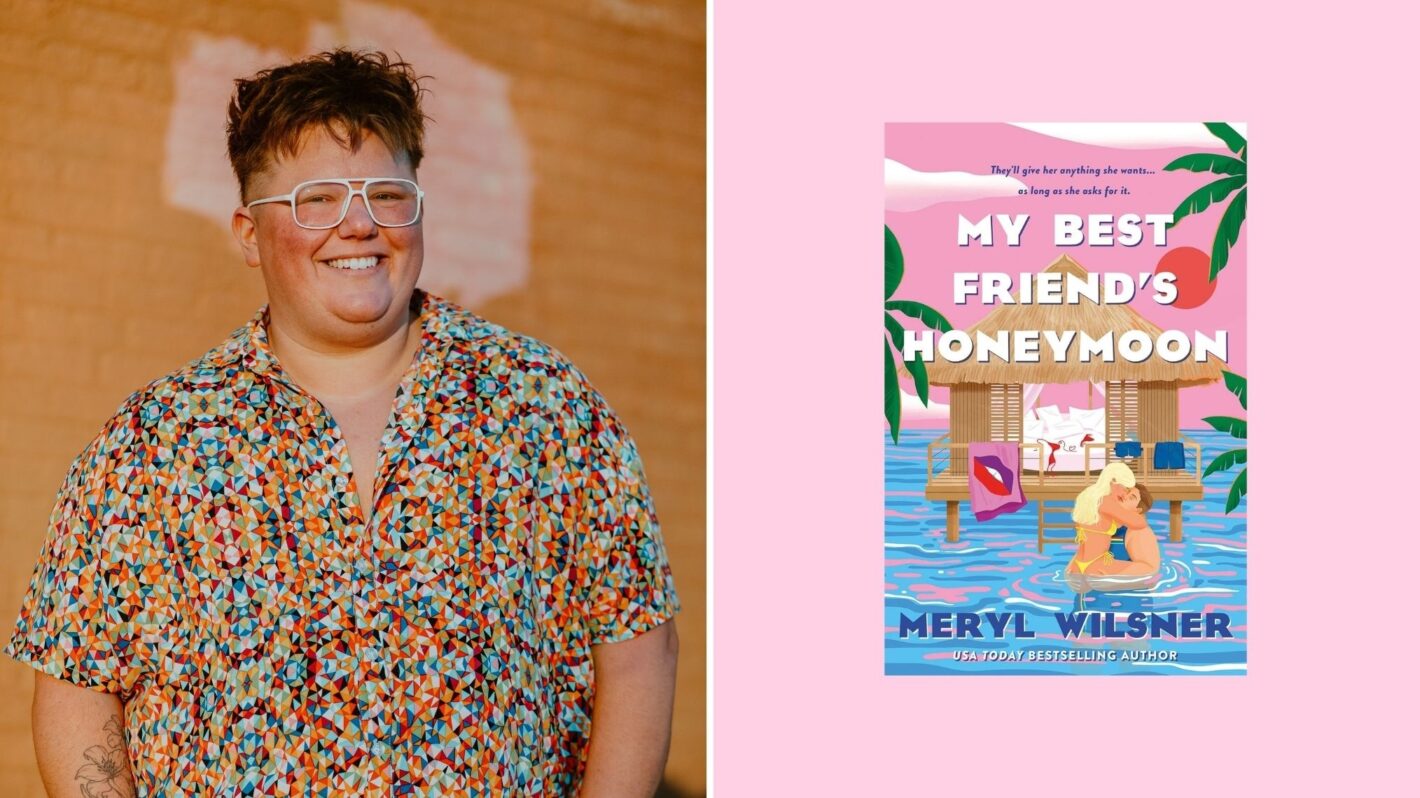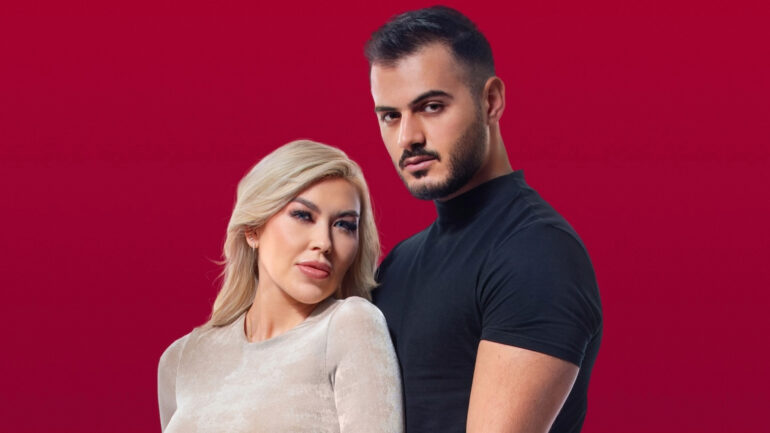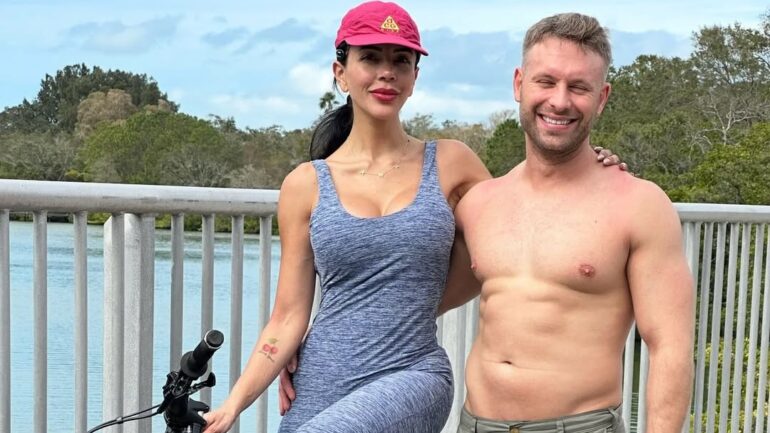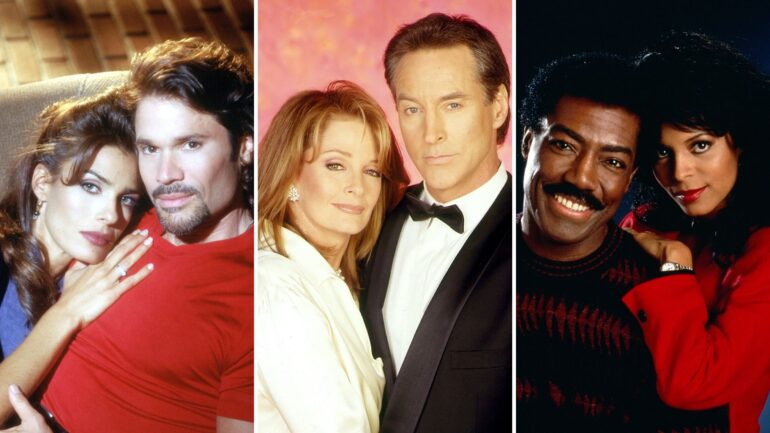Exclusive Interview
Meryl Wilsner Dives Into ‘My Best Friend’s Honeymoon’ & Teases Their First Sequel

Who wouldn’t want to get everything they ask for? That’s exactly what Ginny promises to give their best friend Elsie when her engagement goes up in flames, and the duo decides not to let a romantic honeymoon getaway go to waste. But what happens when what Elsie wants is to wade into new territory in their relationship? (Hint: An incredible amount of dirty talk and a potential friend breakup sure to leave you wrecked.)
My Best Friend’s Honeymoon is the latest from Meryl Wilsner, the author behind many of your favorite queer romances, including Something to Talk About, Mistakes Were Made, and most recently Cleat Cute. (Yes, that Cleat Cute, which has been picked up by Sue Bird and Megan Rapinoe for a TV adaptation.) For their first friends-to-lovers romance (though Wilsner considers all their books idiots-to-lovers), Wilsner shares with Swooon the difficulty of naming what you want, facing codependency in a friendship, writing fantastic dirty talk, and the next time readers might see Ginny and Elsie.
My Best Friend’s Honeymoon is your first friends-to-lovers story. What made you want to explore this trope, and what have you enjoyed about the dynamic?
Meryl Wilsner: It was really important to me to demonstrate that romance was not inherently better than friendship. That becoming a romantic relationship wasn’t like an escalator leading them to a step above friendship. Especially for these two characters, their friendship is the most important thing in the world to them. And when that turns sexual and romantic, it isn’t inherently better. That was something that I really tried to explore and get across through the characters, is that being friends with each other and being in each other’s lives is the most important thing to them.
I read in an interview that you consider your books to be “idiots-to-lovers” trope. We need an official definition, and how do Ginny and Elsie fall into this concept?
Wilsner: I just love the idea of idiots-to-lovers. Because I think that no matter what the plot of the book I write, my books tend to be people who don’t think they’re good enough for the other person. There’s a lack of self-confidence in some of my characters. In Mistakes Were Made, one of my characters, Cassie, is very cocky, but when it comes down to the big, important stuff if you dig underneath her cockiness, she has this [idea of] “this can’t be real. Somebody can’t actually feel like this about me.” And so that’s where the idiots-to-lovers comes from. I hope that when people read my books, it’s so obvious that these two are madly in love with each other, fit well together, should be together, and they’re just too dumb to figure it out. That’s Elsie and Ginny, too. They both have that fear of their friendship is so important, and they’re not willing to do anything that could possibly risk it. And that makes it difficult for them to see what readers, but also people in Ginny and Elsie’s life, see, which is they are crazy in love with each other and always have been.
Ginny promises to do whatever Elsie wants for this trip, which sounds ideal, but can that concept go too far?
Wilsner: It was the “what happens in Vegas, stays in Vegas” idea. But on this trip, we’ll do anything that you want, as long as you say that that’s what you want. And to be fair, I do that partially because I really wanted to write dirty talk. I was like, this gives me a real excuse to write characters actually saying things that they want to do to each other, or that they want the other to do to them. Because sometimes in romance, I think that there’s dirty talk, but I just don’t buy that this character would actually say this out loud. So that was honestly part of where that idea started from. But, it does seem like a perfect idea. You get whatever you want as long as you ask for it. But for Elsie, asking for things when it’s like, “take a picture with me,” or “bring me my drink,” those things can be fun and easy to ask for and can be a real game. But when it’s stuff like, “kiss me”, or “tell me how you feel about me,” it becomes a lot harder to ask for the things that matter, even when you’re allowed to ask for whatever you want. And then there’s also that worry that Elsie has of if this all just a game. Because it started as a fun game, and now that she’s asking for the important things, she has that worry of is this just still part of the game, or is this actually something that Ginny willingly wants to give me? I think it ends up making things more confusing and harder for her to trust her own feelings and Ginny’s feelings.
Although the deal centers around Elsie’s inability to speak up for what she wants, how does that problem show up for Ginny, too?
Wilsner: Having something in their past where Ginny has already been rejected in that way, they’re not willing to risk it again, especially because it was really hard when they were rejected by Elsie as a kid. Elsie powered through. She was like, we’re going to stay friends no matter what, I don’t care. But Ginny doesn’t want to go back to that. Ginny doesn’t want to risk it again. And that all goes back to the idea that romance is not inherently better to them than friendship. They’re not willing to potentially make it awkward again, even though they would love to be honest and see what happens.
Codependency and avoidance turn out to be big roadblocks in Ginny and Elsie’s friendship. Why were those problems you wanted to explore?
Wilsner: Avoidance is a standard one when it comes to romance. I think the reason for that is it’s really hard to be honest about your feelings when they’re so big. It’s really hard to make yourself vulnerable, even with people who have had your back for a really long time. It’s easier to see things going wrong than to imagine things going right or going the way that you want them to go. It’s a lot easier to just not talk about it, especially for these two when they’re having so much fun on this vacation that feels like it’s not real life. It’s so easy to just be like, we’re having a good time. We don’t have to address anything. If we talk about this, it could mess it up. That’s the avoidance, and the codependence aspect was important to me because I think that it can be easy to follow a path that just happens to be in front of you. It was important for me to have Ginny and Elsie separate from each other and do the things that they wanted to do for themselves and realize they still want to be together, and none of the choices that they’re making are because they’re friends, but I still want you in my life. That was important for both of them to learn because they’ve been together for so long. They’ve been best friends for so long. I mean, Ginny made choices about college in part based on Elsie. They needed to be separate from each other and make their lives into what they wanted them to be, and to realize, I don’t need you. I can do all the stuff on my own, and I am doing all the stuff on my own, but you still make my life better.
As any bae-cation novel would, there’s plenty of sex in this novel. You mentioned dirty talk earlier, so how did you develop your characters’ dirty talk?
Wilsner: Having Elsie have to ask for what she wants definitely gave me a framework to build off of. I hope that I made it real, and this can be really sexy. But also, Ginny is nonbinary, and [there’s a moment where] Elsie is trying to compliment their anatomy and in the middle of a sex scene is like, “Wait a second, can I call it a pussy? Is that okay?” Because Elsie is worried about giving Ginny any gender dysphoria, and Ginny is just like, “I don’t care what you call it, just touch it!” I tried to walk a little bit of a balance of, yes, this is sexy, but also it is sometimes awkward and funny and real. Sex in the media can often be either perfect or terrible, with no in between there. I hope that I was able to make it feel real.
Were there any sex scenes you were particularly excited to write?
Wilsner: I am happy to have a rim job [in the book]! That’s something that I don’t know that I’ve read in a romance novel, so that was fun to touch on. There’s some verbal degradation. That’s something that was really fun to explore both sides of with Elsie experiencing it and enjoying it, and Ginny being like, “Oh my God, is it okay that I’m saying these things to you? Like, I’m saying them because you seem to be liking it, but oh my god I love you, and this isn’t what I mean.” That was a really fun scene to write.
Ginny and Elsie are on a sexual journey with each other, experimenting with what the other likes. Why was it important to showcase safe sexual exploration?
Wilsner: I think it’s just part of their relationship in general. Ginny wants to take care of Elsie. That is who Ginny is as a person. Ginny likes carrying the bags and taking care of things and all of that. And that’s true with any of Ginny’s relationships. Ginny’s a butch. Ginny likes to be that caretaker and be that provider. And that’s true outside of the bedroom and inside of the bedroom. That was something that was really important to me in Ginny’s characterization, that they would be checking in with Elsie. They would be making sure that this was a good and safe and fun experience for her. Because sometimes when people talk about consent, or people talk about safe and healthy relationships, that doesn’t necessarily come off as sexy, but I think it very much is because you can’t be having fun when you’re not feeling safe, right? So it’s not boring and uncool that they’re checking in with each other because that’s the only way to make sure that everyone’s having a really great time.
What’s next for you?
Wilsner: The book I’m working on now is actually a sequel to My Best Friend’s Honeymoon. It wasn’t necessarily planned that way, but I had the idea of a florist and a baker working on a wedding together and falling in love, and then realized, oh, this can be Ginny’s and Elsie’s wedding. We were able to connect it in that way. This is the first time that I’m doing a sequel of any kind, so that has been really fun to still get to play with the characters even after their story is over.






